What does millennial cultural tourism look like? From the institutional standpoint, it’s about making exhibition and outreach programming more “social” and appealing to younger audiences with stuff they think they’ll like: “late night” events, live music, food trucks, booze. Publicly funded outdoor summer music festivals now come with visual arts programming; at last month’s WayHome Festival outside of Barrie, Ontario, a curator was hired to oversee interactive art installations scattered through the grounds, providing the perfect backdrop for festival goer’s selfie stick snaps.
From a policy standpoint, it’s about using art to entice city folk out to rural areas in the idealistic hope of blunting the migration of youth in those areas to the city. Enter Sunday Drive Art Projects, a 16 day biennial-like art festival in Warkworth, a Northumberland County village about an hour and a half outside of Toronto underwritten by provincial cultural tourism dollars. Sunday Drive is working with six urban artist-run centres, artist collectives and “alternative exhibitors” in presenting installation-based work in a rural context. The Festival is basically a townie takeover of the folk: a new generation of roadside attractions to get culture savvy Torontonians to embrace the road trip. (It closes August 30.)
Unsurprisingly, the show looks like an earnest urban ruralist prototyping of a processed pastoral: a 30-foot dung beetle inflatable sculpture in a rustic old barn, an artist restaurant in the middle of a river, a three-dimensional #NATURE text piece near a bridge over a picturesque creek. Some artists made work that demonstrated a superficial understanding of rural lifestyle, while other artists were more sensitive to the context and even catered to our desire to brag about our countryside travels. See this art before shopping for your country supper at the farmer’s market with a traveler’s cup of soy latte, or while high on mushrooms under the starry twilight before crashing out at the nearby camping grounds. There’s no harsh vibes here.
This was evident in the audience that came out to Sunday Drive’s opening kickoff last weekend: we were picked up from the city by what was essentially a snack-and-beer-filled art party bus and dropped off in the town’s main street. This was an event for urbanites by urbanites, in a rural setting mostly devoid of locals. Curator Faith Moosang’s catalog statement acknowledges a commonality among all of Sunday Drive’s selected artists: they are “professional urban-based creators working or presenting work in a rural space.” During it’s sixteen-day run, Sunday Drive transforms Warkworth into a sprawling pop-up gallery, taking over the main street’s empty commercial buildings and heritage sites.There’s an obvious emphasis on weekend programming aimed at city audiences—panels, tours and performances are scheduled to accommodate day-trippers. (Camping options are also available.)
The best Sunday Drive projects then, are installations with an artificial, extravagant aesthetic situated within the context of Warkworth’s folksy wooden rural, the extremity suggesting how both are, in their own ways, artificial. In revelling in the superficial, it’s more honest about the small town being a spectacle.
A large-scale sculpture made of long silver and hypercolour industrial tubing and coils by Oliver Pauk and Michael Vickers hung high above the Warkworth Mews, an outdoor courtyard and gazebo right in the middle of the Main Street. In the window of the attached commercial building, a “for lease” real estate sign was visible. It looked like an explosion of dicks—engorged like the comically inflated Toronto real estate market—had ejaculated on the street. Diana Lynn VanderMeulen’s bubblegum-pop psychedelic installation in a nearby small-scale barn invited viewers to walk over coloured sand and through hanging mylar fringe to see ice cream caulking mounds lit with flashing trippy lights. An atonal soundscape and monastic hush suggested rave chill out room domesticity. Her work evokes Tricia Middleton’s embrace of disposable materialism, but Vandermeulen infuses a strangely compelling spiritual resonance in her shiny happy plastics. I appreciate how it disavows the urban ruralist authenticity.
In contrast, an installation like the aforementioned “#NATURE” by Sean Martindale — large, artificially-lit three dimensional letters of the phrase positioned at a bridge near a creek — satirizes millennial #YOLO-esque framing of plein air experiences. It was direct and forthright in acknowledging but also questioning our desire to divide urban/rural constructs when in reality, they’re pretty much the same.
Weak work plagued the show. Some installations suffered from being so lost in the rural theme park setting. Max Streicher’s monumental “Dung Beetle” — yup, that beetle inflatable — got upstaged by the salvaged provenance of the old red barn, the historic Cow Palace on the Warkworth Fairground. Worse, was Studio 835’s “Lazer Harp 2.0”, a laser harp in a barn garage—it was like a maker faire attraction. In both cases, the best quality of the art wasn’t the work itself, but the architecture surrounding it.
It was also strange how few works grappled with local identity. While I appreciated Sunday Drive’s efforts to largely forgo socially-engaged community-based work — this was art, after all, by and for urbanites, so why be disingenuous? — those that did weren’t granted the rigorous site-specific contexts that they deserved. Onyeka Igwe and Felix Kalmenson’s “In The Shadow of the Rainbow” is a video and intervention exploring the dissonance between overt pop culture pinkwashing and the invisible struggles of LGBTQ prisoners. Two flat screens, mounted on brutalist prison concrete plinths, contrasted stark text testimonials from prisons with scenes of rainbow advertising; behind the screens, were photocopied “Resource Library” handouts, and an effigy on a plinth of a small rainbow flag in a Prison Break Pilsner tall can. As one of the rare works to engage directly with Warkworth’s local identity as a queer-friendly weekend warrior destination, but also the site of a nearby penitentiary, it strikes a welcomed chord of dissent, puncturing the no-harsh-vibes-here bubble. But I wanted more than a two-channel video installation only viewable from outside the storefront of a commercial building on Main Street. Political activism doesn’t take place behind glass, and rarifying those efforts are at odds with its goals.
Nonetheless, Sunday Drive was worth, well, the drive, for Dean Baldwin’s “InSitu”—a dinner served at a half-submerged table where diners sat in chairs in the river water. (Baldwin’s Q.W.Y.C. exhibition at the Museum of Contemporary Canadian Art is in its last week.) Like Martindale, Baldwin reflected back that rarefied urban ruralist tendency but was unpretentious and accessible, and I definitely got the sense I was among both tourists and locals. By the time I got my table for four, it was night, and I was ready to kick back with a glass of rosé and sample the foraged amuse bouche menu offerings with friends in the candlelight, albeit sitting in waters rippling just below my knee. Here, I enjoyed being in the tongue-in-cheek #Nature, replete with downtown trappings.
UPDATE: Felix Kalmenson, the artist behind the video and intervention project “In The Shadow of The Rainbow” in collaboration with Onyeka Igwe for Sunday Drive, sent AFC a message via Facebook with a disappointing status regarding their work. His work also included poster stills and testimony from the videos that were posted on Main Street and partially removed without permission a few days ago by RBC employees. They took down images that contained what Kalmenson describes as RBC’s “platitude laden imagery” from PRIDE. The rest were removed yesterday by people in the town who were uncomfortable with the work.
Kalmenson will give a talk alongside Igwe and other artists involved with the show at Warkworth’s Town Hall (40 Main Street) tomorrow at 1PM. The politics of this work and subsequent response will be discussed.

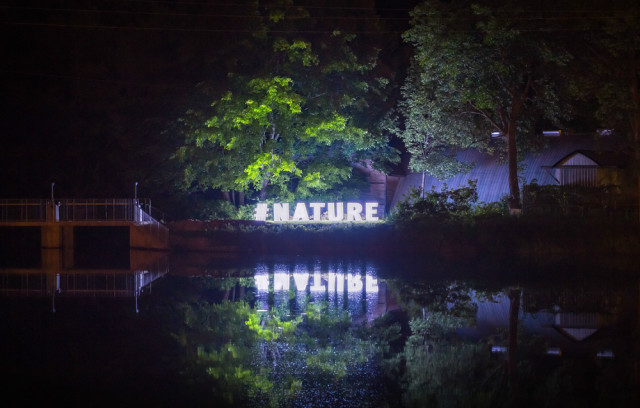
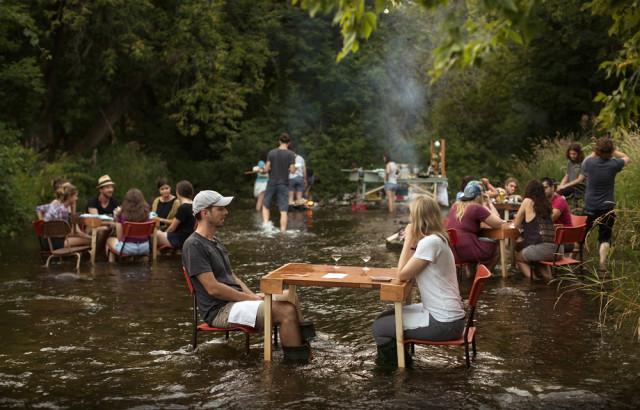
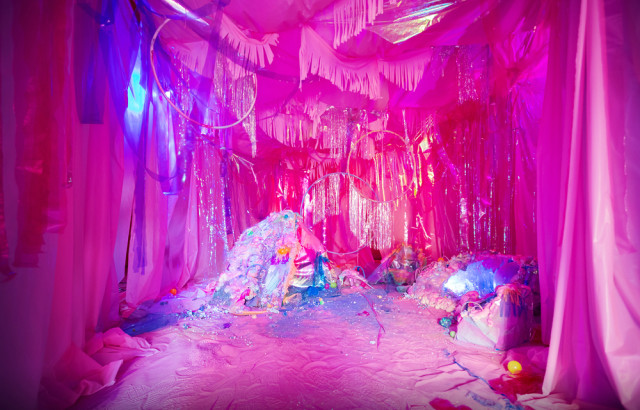
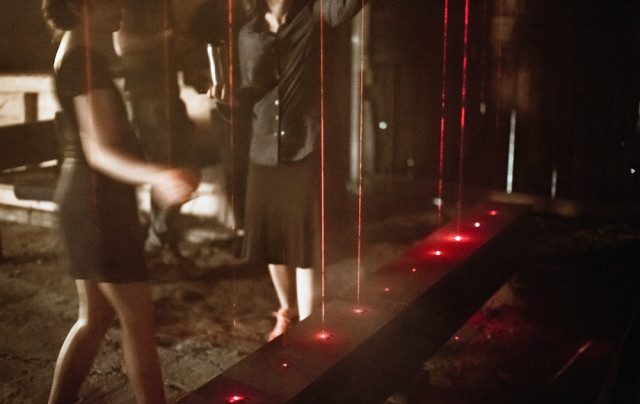
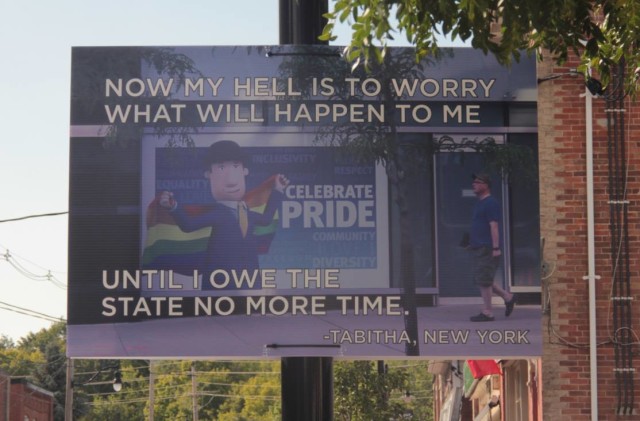

Comments on this entry are closed.